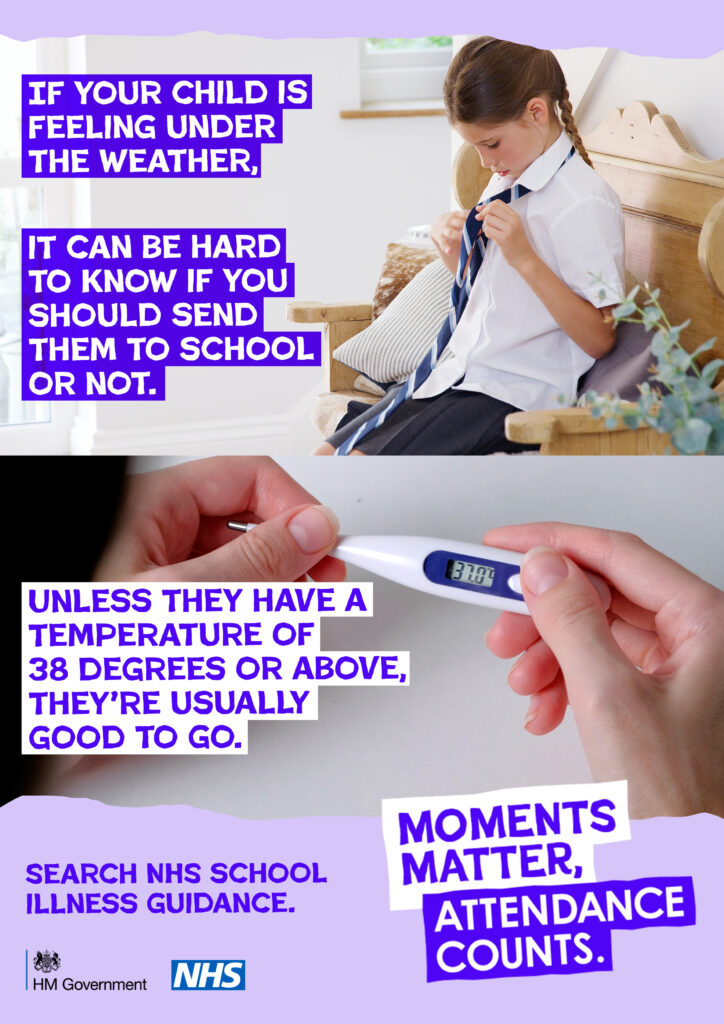
For most pupils, the best place to be is in school, surrounded by the support of their friends and teachers.
This is important not just for your child’s learning, but also for their overall wellbeing, wider development and their mental health. The Chief Medical Officer has written a letter to schools explaining why regular attendance is vital to the life chances of children and young people.
As a parent, it can be difficult to know when to send your child into school if they are feeling unwell or mildly anxious, but finding solutions is a team effort between schools, parents and children, and there is support and information available to help you make the best decision for your child.
If you have concerns about your child’s attendance or are unsure whether you should bring them to school, please get in touch with the school for advice and to see how we can support.
Please see our procedures below in relation to school attendance:
ATTENDANCE REGISTERS & LATENESS:
At the start of the morning and afternoon sessions, a member of staff is required by law to complete the registers. Lateness is also recorded in the register. All late arrivals are monitored on a weekly basis and will be discussed with parents if they occur regularly.
Children arriving to school late must be accompanied by an adult and report to the office to register. They also need to explain why they are late. A child coming to school late regularly misses out on the start of lessons; just 10 minutes late per day is equivalent to missing out one English or Numeracy lesson per week.
ABSENCE:
If your child is absent from school, we would expect you to do the following:
- Telephone or email to inform us about the absence before 9.20am and the reason why.
- Provide a medical/doctors note if requested by the school so that we can keep it on record.
If we do not know where a child is and you have not contacted the school:
- The office will phone you to confirm why your child is absent from 9.20 am and as soon as is practicably possible.
- If we cannot get hold of the priority number 1 contact we will attempt to make contact with other contacts that the school holds as emergency contacts.
If the school cannot make contact with the parent/carer and has not received confirmation of a reason for absence:
- The school may carry out a home visit/welfare check. This will be carried out by the DSL (Designated Safeguarding Lead) or a deputy DSL. We would do this on or before the third day of absence or on day one of absence if we have a reason to be concerned. We would expect to see the child during a welfare check even if they are ill. This is in line with our statutory safeguarding duty of keeping children safe.
TYPES OF ABSENCE:
Absences are recorded as being authorised or unauthorised:
Authorised Absence:
This is an absence that the school is aware of and accept as being reasonable.
These absences may include:
- Illness
- Visits to the doctor’s, hospital or dentist known in advance, although parents are asked to make appointments out of school hours where at all possible.
Please note: all parents must provide evidence of medical appointments e.g. appointment letter. - Religious observance
Unauthorised Absence:
This is where the reason for the absence is unknown to the school, or the reason given is inappropriate. These absences may include:
- Medical reasons that are not accompanied with an explanation or with a note/letter on return to school
- Holidays
- Sleeping in/tiredness
- Visiting relatives, attending weddings, or day trips
MANAGING MEDICAL ABSENCE
Medical absence forms a large proportion of authorised absence, particularly at primary level. These guidelines may help to manage it as part of our schools’ attendance policy. Parents should be aware that the school will respond to persistent medical absence.
MONITORING OF ABSENCE
The headteacher monitors absence and will seek advice from the LA school attendance team where appropriate
- Only the Headteacher can authorise absence. If a parent contacts school to say their child is ill, it is up to the headteacher’s discretion to choose to authorise or not.
- Broken weeks are of concern as it may be an indicator of other concerning factors relating to the family or child.
Please see the linked guidance for parents and carers from Warwickshire Attendance team for more information: https://www.warwickshire.gov.uk/school-attendance-exclusions/school-attendance-guidance-parentscarers/3

